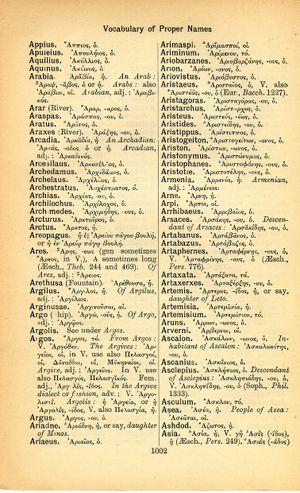Arabia: Difference between revisions
(Names) |
(6_2) |
||
| Line 7: | Line 7: | ||
<b class="b2">Arabian</b>, adj.: Ἀραβικός. | <b class="b2">Arabian</b>, adj.: Ἀραβικός. | ||
}} | |||
{{Lewis | |||
|lshtext=<b>Ā̆răbĭa</b>: (on [[account]] of the [[long]] A in Prop. 3, 10, 16, [[erroneously]] written by [[many]] Arrabia; cf. Jahn ad Hor. C. 3, 4, 9), ae, f., = [[Ἀραβία]]>.<br /><b>I</b> In an extended [[sense]], the [[country]] [[Arabia]], divided by the ancients [[into]] Petrœa (from its [[principal]] [[city]], [[Petra]]), Deserta, and [[Felix]], Plin. 5, 11, 12, § 65; Mel. 1, 10; Vulg. 3 Reg. 10, 15; ib. Gal. 4, 25 al.—<br /><b>II</b> In a [[more]] restricted [[sense]], a [[town]] in [[Arabia]] [[Felix]], Mel. 3, 8, 7. —Hence, Ā̆răbĭcus, a, um, adj., Arabic, Arabian: [[odor]] (i. e. tus), Plaut. Mil. 2, 5, 2: [[sinus]], Plin. 2, 67, 67, § 168; Mel. 3, 8, 1: [[resina]], Plin. 14, 20, 25, § 122: [[adamas]], id. 37, 4, 15, § 56: alites, id. 37, 10, 54, § 146: [[balanus]], id. 12, 21, 46, § 102: [[lapicidinae]], i. e. of [[alabaster]], id. 36, 12, 17, § 78: [[spina]], the [[acacia]], id. 24, 12, 65, § 107: [[vectis]], Curt. 7, 2. 17. —Absol.: Ā̆răbĭca, ae, f. (sc. [[gemma]]), a [[precious]] [[stone]], [[similar]] to [[ivory]], perh. a [[kind]] of chalcedony or [[onyx]], Plin. 37, 10, 54, § 145; Isid. Orig. 16, 14.—Ā̆răbĭcē, adv.: facite olant [[aedes]] Arabice, [[make]] the apartments [[redolent]] [[with]] the perfumes of Araby ([[frankincense]], [[which]] [[was]] brought from [[Arabia]]), Plaut. ap. Diom. p. 378 P. (Arabice olet, id est ex odoribus Arabicis, Fest. p. 23): Arabice sacri vocantur, in Arabic, Sol. c. 33. | |||
}} | }} | ||
Revision as of 08:19, 13 August 2017
English > Greek (Woodhouse)
Ἀραβία, ἡ.
An Arab: Ἄραψ, -αβος, ὁ or ἡ.
Arabs: also Ἀράβιοι, οἱ.
Arabian, adj.: Ἀραβικός.
Latin > English (Lewis & Short)
Ā̆răbĭa: (on account of the long A in Prop. 3, 10, 16, erroneously written by many Arrabia; cf. Jahn ad Hor. C. 3, 4, 9), ae, f., = Ἀραβία>.
I In an extended sense, the country Arabia, divided by the ancients into Petrœa (from its principal city, Petra), Deserta, and Felix, Plin. 5, 11, 12, § 65; Mel. 1, 10; Vulg. 3 Reg. 10, 15; ib. Gal. 4, 25 al.—
II In a more restricted sense, a town in Arabia Felix, Mel. 3, 8, 7. —Hence, Ā̆răbĭcus, a, um, adj., Arabic, Arabian: odor (i. e. tus), Plaut. Mil. 2, 5, 2: sinus, Plin. 2, 67, 67, § 168; Mel. 3, 8, 1: resina, Plin. 14, 20, 25, § 122: adamas, id. 37, 4, 15, § 56: alites, id. 37, 10, 54, § 146: balanus, id. 12, 21, 46, § 102: lapicidinae, i. e. of alabaster, id. 36, 12, 17, § 78: spina, the acacia, id. 24, 12, 65, § 107: vectis, Curt. 7, 2. 17. —Absol.: Ā̆răbĭca, ae, f. (sc. gemma), a precious stone, similar to ivory, perh. a kind of chalcedony or onyx, Plin. 37, 10, 54, § 145; Isid. Orig. 16, 14.—Ā̆răbĭcē, adv.: facite olant aedes Arabice, make the apartments redolent with the perfumes of Araby (frankincense, which was brought from Arabia), Plaut. ap. Diom. p. 378 P. (Arabice olet, id est ex odoribus Arabicis, Fest. p. 23): Arabice sacri vocantur, in Arabic, Sol. c. 33.

